May 23, 2009 • General
Jaan Ehlvest (2606) – Hikaru Nakamura (2701) US Championship, Saint Louis 9.5.2009
1.Nf3 Nf6 2.c4 e6 3.g3 b6 4.Bg2 Bb7 5.0-0 Be7 6.b3 0-0 7.Bb2 d5 8.e3 c5 9.Nc3 Nc6!? (Diagram 1)
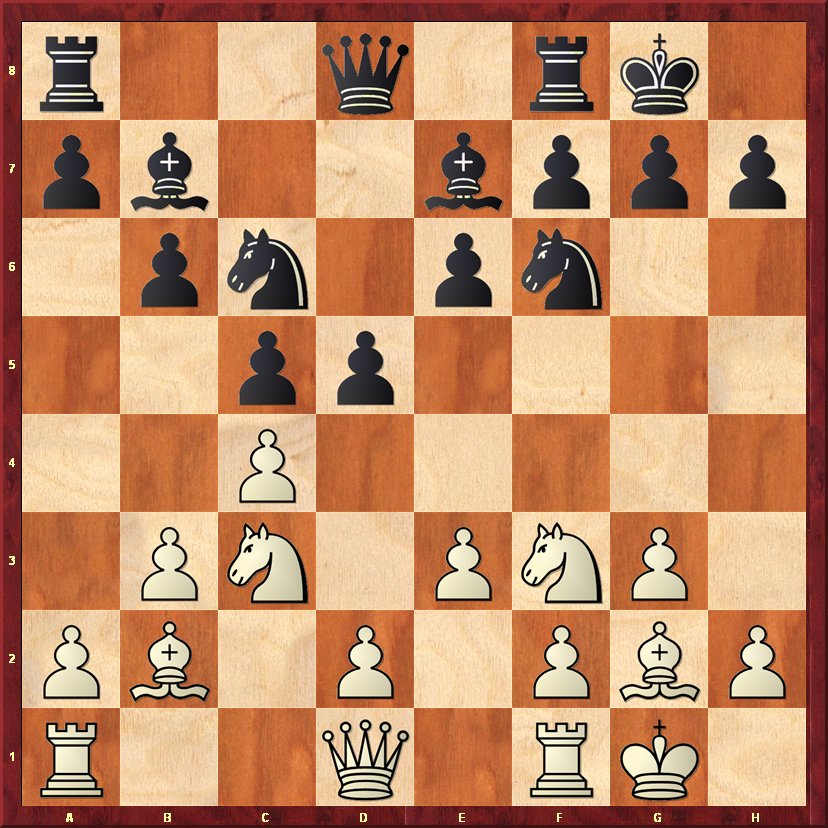
This pretty much the starting position for the whole variation. However, despite being roughly equal, 9…Nbd7 was slightly easier to play.
10.cxd5 Nxd5 11.Nxd5 Qxd5 12.d4 Rad8 13.Ne5 (Diagram 2)
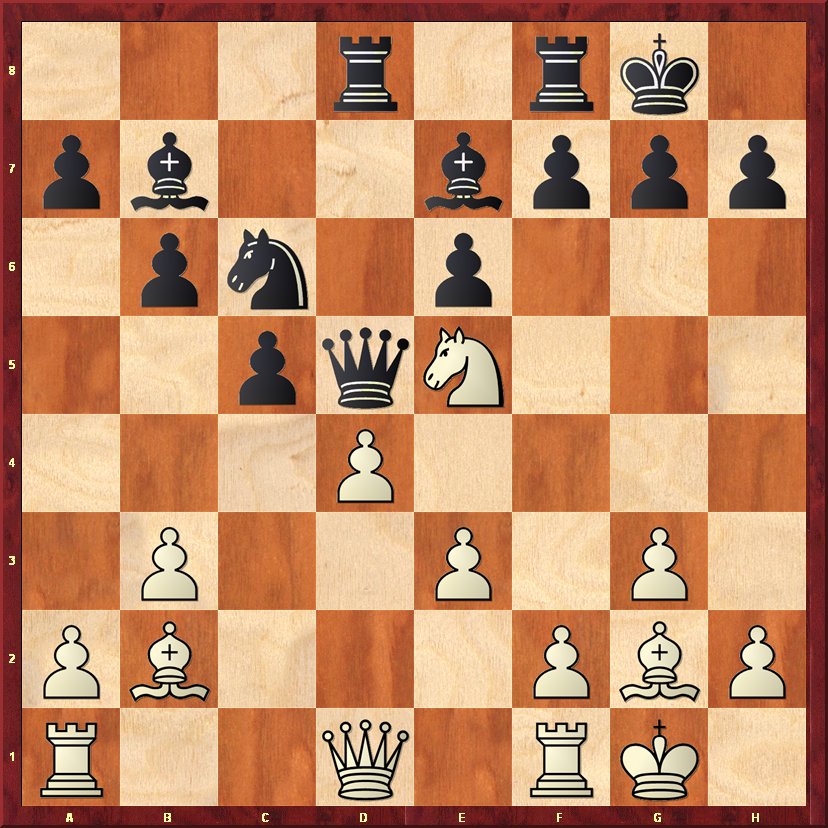
The past few moves have all been standard theory. However, here I slightly lose my head and played 13…Qxg2?! (13…Qd6 was slightly more sound. After 14.Qe2 Nxe5 15.Bxb7 Bf6 White is slightly better, but the position isn’t particularly anything special. Another try is 14.Nd7 Qf5 15.e4 Qg5 16.h4 Qh6 17.Bc1 g5 with an unbalanced position. (Diagram 3)
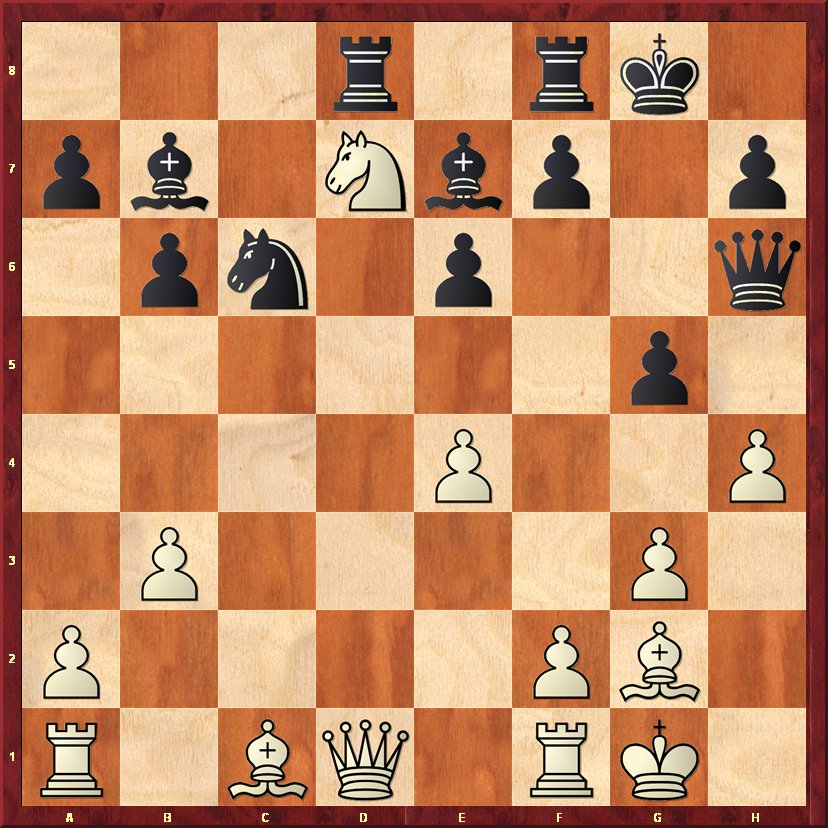
However, the game continued as follows. 14.Kxg2 Nxe5 15.f3 cxd4 16.exd4 (not 16.Bxd4 Nxf3! 17.Rxf3 e5 after which Black has no problems.) 16…Nc6 17.Qe2 Rd5 18.Rac1 Rfd8 (Diagram 4)
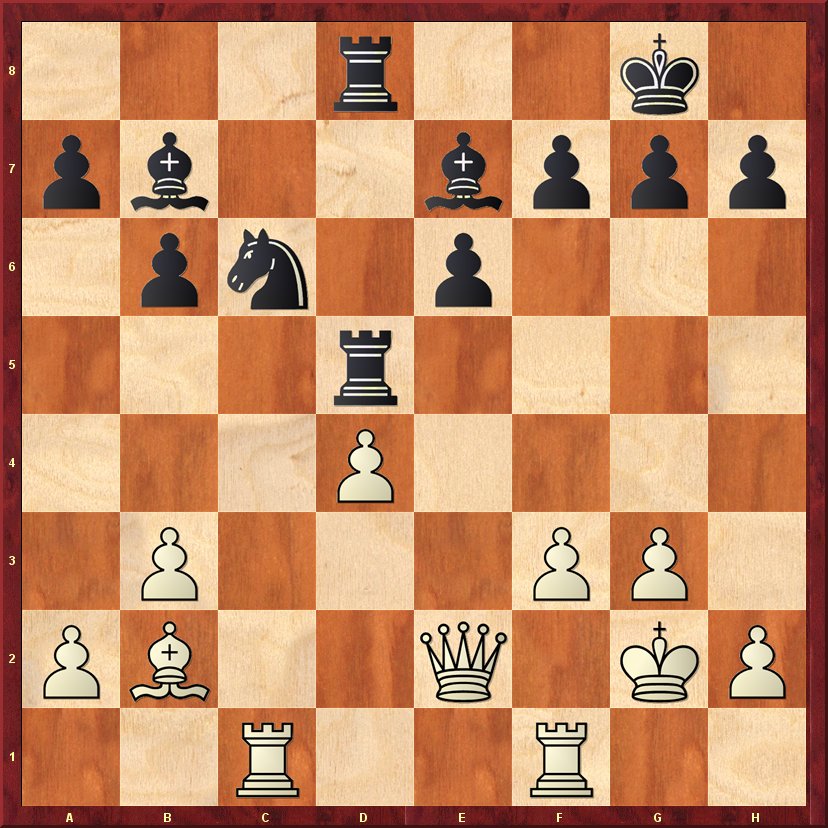
Here, I have achieved the basic setup which I envisioned when I first decided to sacrifice my queen. When I saw this position in my analysis, I simply did not see how White could progress with sacrificing an exchange somewhere. I figured that I will always have Bf6, Nxd4 ideas or even g5-g4 plans creating discoveries along the long diagonal. Unfortunately for me, Ehlvest remained calm under pressure and found the best “human” move.
19.Rc4! Ba6 (All other moves are bad. For example, 19…Bf6 20.Qf2 Nxd4 21.Rc7 Ba6 22.Rd1 and White is clearly winning. 20.Qe4 Bxc4 21. bxc4 R5d6 22.Rd1 Bf6 23.Ba3! Rxd4 24.Rxd4 Nxd4 (Diagram 5)
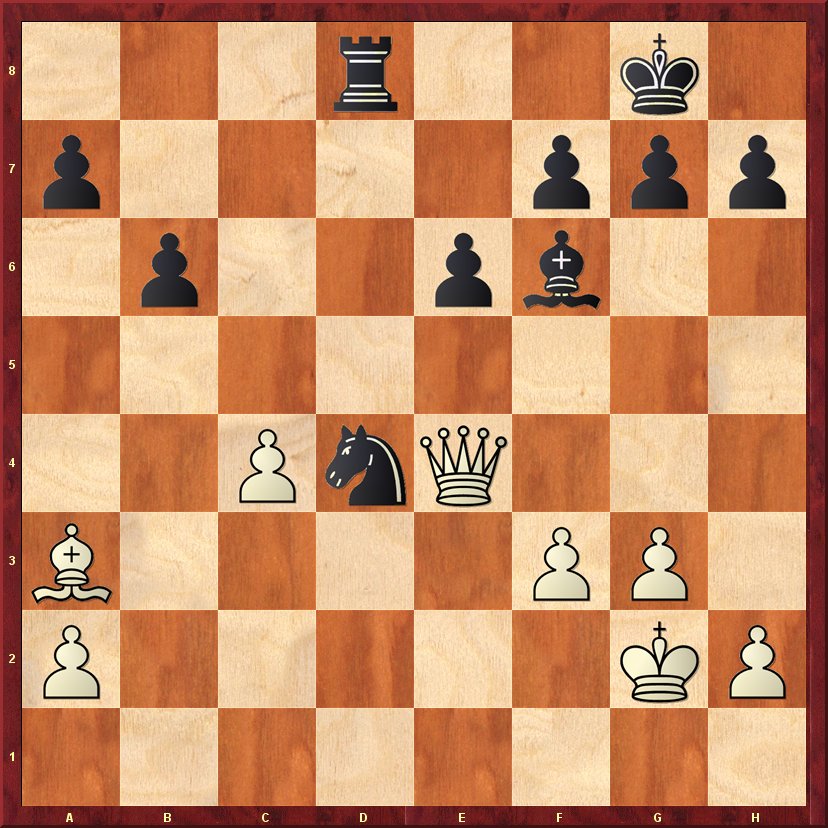
The last set of moves have been more or less forced. Ehlvest has done a good job to this point as he has simplified and retains good winning chances. 25. Bc1!? (According to the computers, 25.Qb7 g6 26.Qxa7 Nc2 27.Bc1 Ne1 28.Kh3 Nxf3 29.Qxb6 h5 30.c5! is winning. However, it is hard to blame a human as this looks quite dangerous due to g5-g4 Rd1-g1 threats or Rd1 and Rh1 ideas too.) 25…h5 26.g4! (Now 26.Qb7 would be a lot less effective after 26…Nf5 27.Qxa7 Rd1 28.Qa3 Be7 29.Qc3 Bc5.) 26…hxg4 27.fxg4 g5 (Diagram 6)
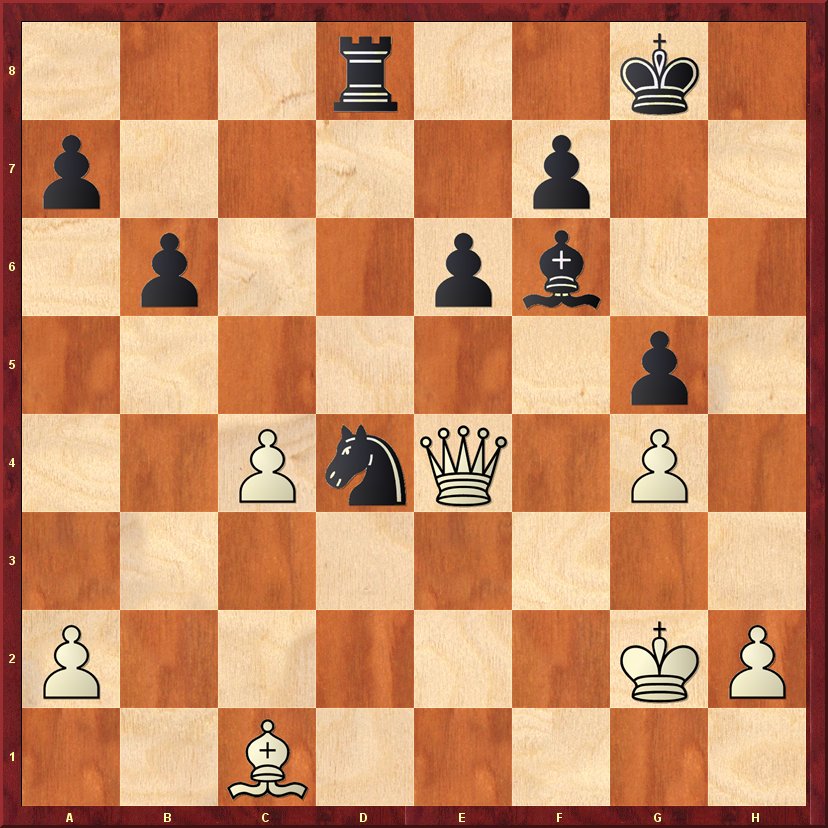
This is the critical position. If Jaan had played 28.h4! gxh4 29.Qf4! Bg7 30.Qc7 he would have had excellent winning chances. After the text move, I am able to set up a fortress more or less regardless of what he does. 28.Be3?! e5 29.a4 Rc8 30.Qd5 Ne6 31.Kf3 Be7! (Giving a pawn back, but setting up an inpenetrable fortress.) 32.Qxe5 Rxc4 33.Qb8 Kg7 34.Qxa7 Bd8 (Not 34…Bc5 35.Bxc5 Nxc5 36.Qxb6 Rf4 37.Kg3! Nxa4 38.Qd8! and Black is simply losing.) 35.Qd7 Rb4 36.h3 Bf6 37.Qd1 (Diagram 7)
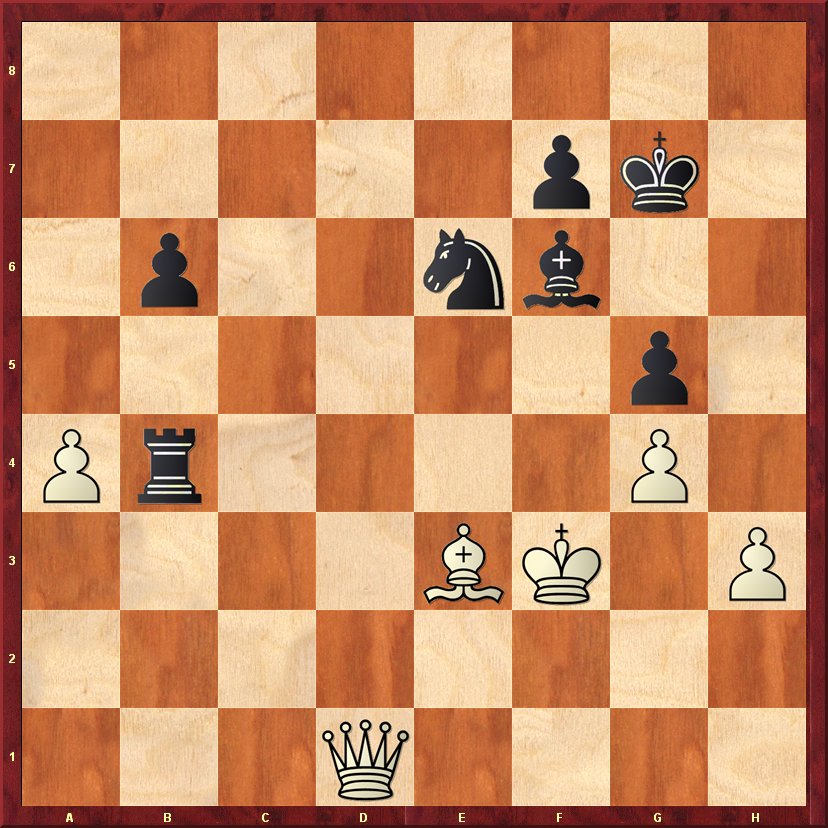
1/2-1/2
White cannot make any progress here, same as Black. Had Jaan not offered a draw, the simplest way to force a draw is 37…b5 38.axb5 (38.a5 Ra4 39.Bb6 [39.Qe1 b4=] 38…Rxb5 with complete equality.
May 22, 2009 • General
Hikaru Nakamura (2701) – Alexander Shabalov (2569), US Championship Saint Louis 8.5.2009
1.e4 c5 2.Nf3 d6 3.d4 cxd4 4.Nxd4 Nf6 5.Nc3 a6 6.Be2 e6 (Diagram 1)
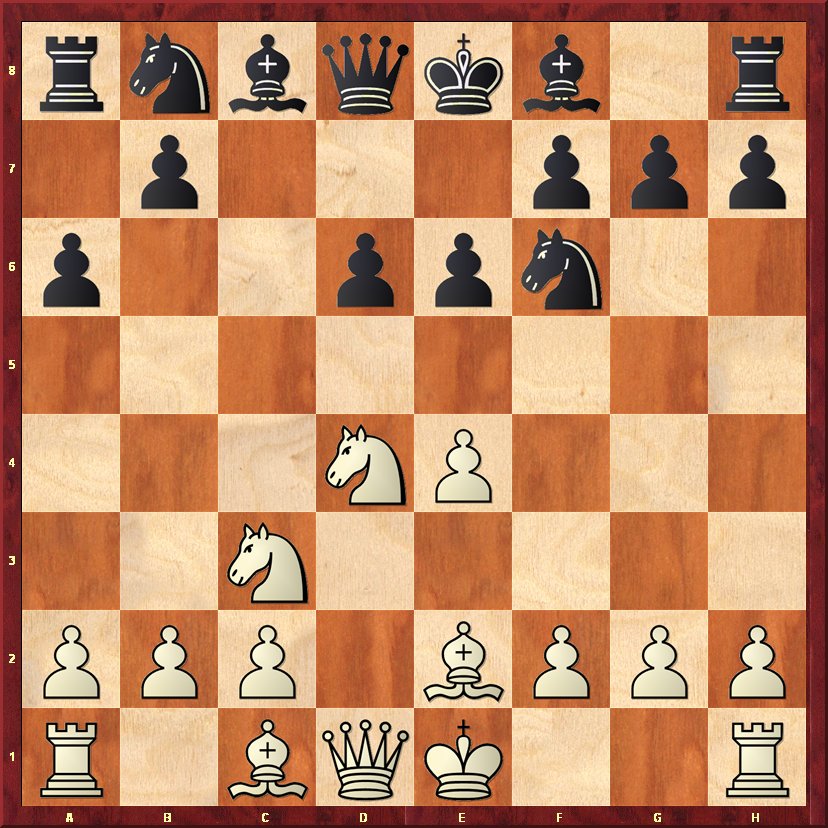
7.0-0 Be7 8.a4 0-0 9.f4 Qc7 10.Be3!? (The main line here is 10.Kh1, but I saw that Karpov had played this before, so there cannot be anything wrong it either!) 10…b6 11.Bf3 Bb7 12.f5!? (Other interesting tries are 12.g4,12.Qe1 and 12.Qe2. Each of these variations has its own flavour to it, but to put it simply it is a matter of taste. 12…e5 13.Nb3 Nbd7 14.g4!? (14.Qe2 was tried by Anand rather unsuccessfully in the game Anand–Wojtkiewicz, GMA Baleares Open 1989 and continued 14…Rfe8 15.Rfd1 Rac8 16.Nd2 Nc5 17.Bf2 d5! 18.exd5 e4 19.Bxe4 Bd6 20.Qf3 Bxh2 with a very complicated middlegame.) 14…h6 15.h4 d5!? (Diagram 2)
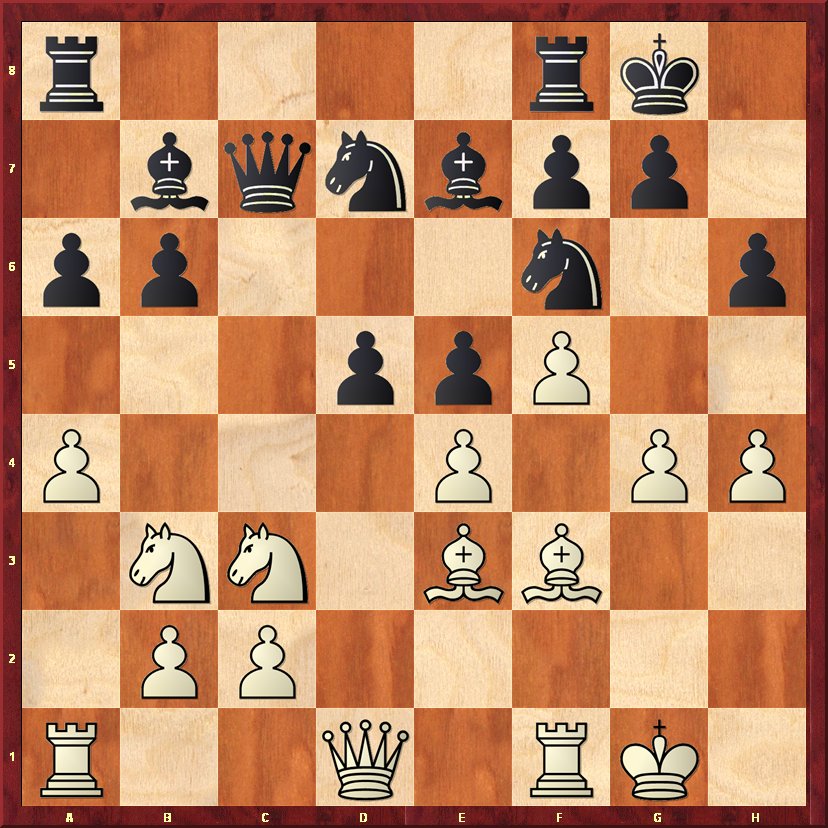
16.exd5 e4 17.Bg2 Qg3 18.Qe1N (Previously, 18.Bf2 Qxg4 19.Nxe4! Qf4 20.Bg3 Qe3 21.Kh2 Nxe4 22.Rf3 was winning in Browne-Winslow, New York Open 1986. However, when I saw 18.Bf2 over the board, I did not see a clear solution to the potential problems posed after 18…Qe5.) 18…Qxe1 (18…Qxg4 19.Rf4 Qh5 20.Nxe4 and Black is going to have some queen issues very shortly.) 19.Rfxe1 Nxg4 20.Bxb6! (Diagram 3)
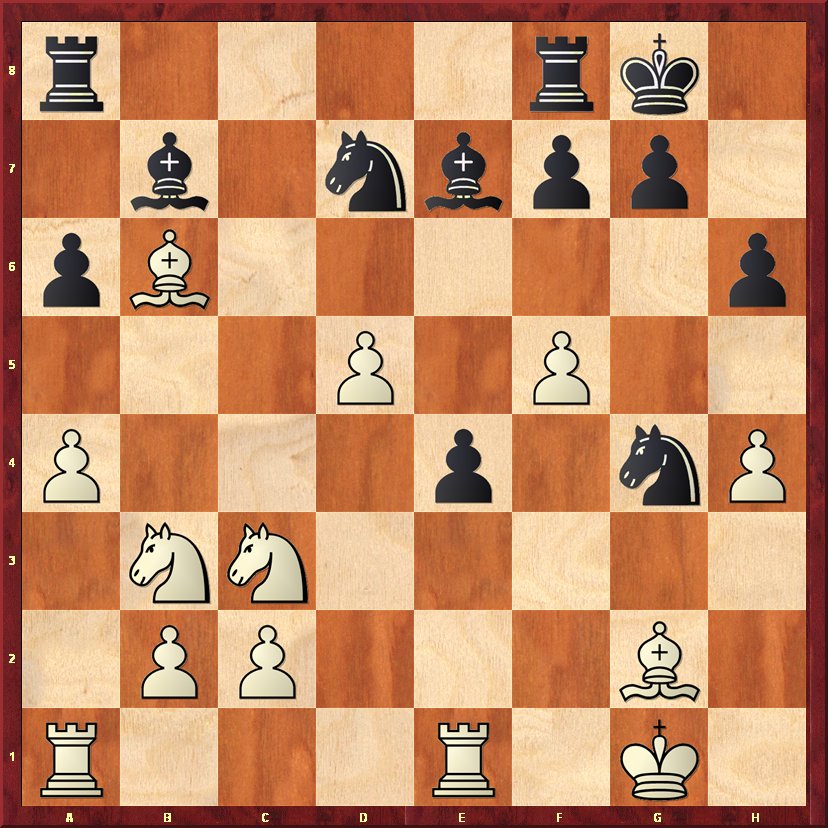
20…Nxb6 21.Rxe4 Nxd5! (During the game I simply thought this position was close to winning. Other variations such as 21….Bf6 22.Rxg4 Bxc3 23.bxc3 Bxd5 24.a5 and 21…Bf6 22.Rxe4 Rac8 23.Rb4 both are clearly winning.) 22.Nxd5 Bxd5 23.Rxe7 (23.Rxg4 Bxg2 24.Kxg2 Rab8 is roughly equal due to the lack of coordination of White’s pieces.) 23…Rfd8?! Although Rybka says this is best, I used a lot of time before playing 23.Rxe7 because I was not 100% convinced that the variation after 23…Bxg2 24.Kxg2 Rfd8 25.Kf3 h5 was that clear, especially for a human.) 24.Bf1! (Diagram 4)
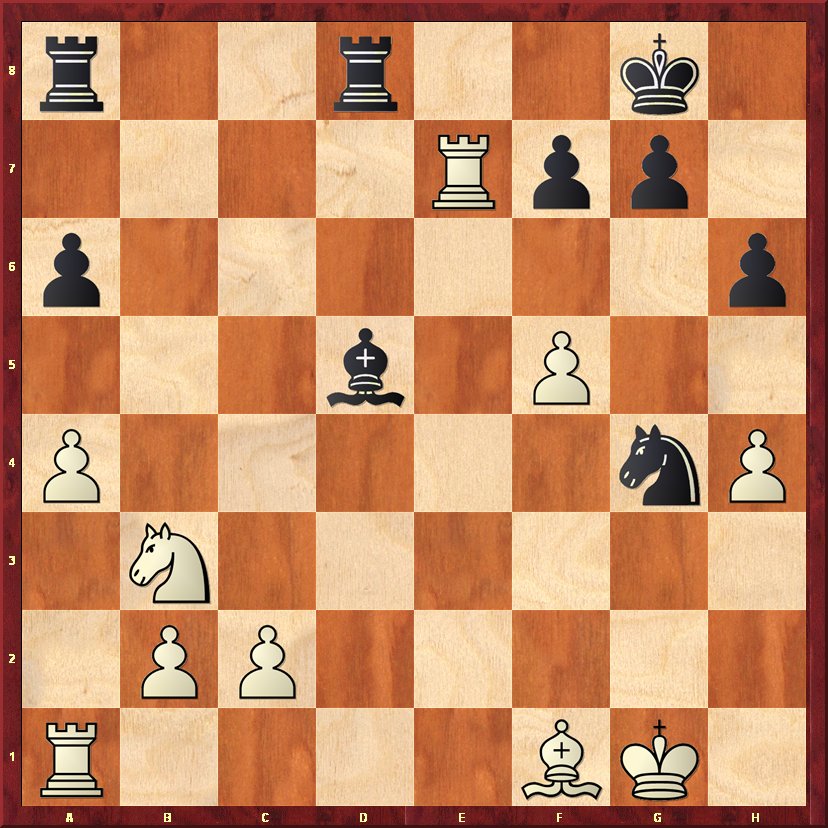
24…Kf8 25.Ree1?! (25.Rae1 was better despite allowing 25…Be6. As 26.Rc7 Bxf5 27.Ree7 Bg6 (27…Be6 28.Nc5) 28.Bd3 and White has a significant advantage.) 25…Rdb8 26.Ra3 Nf6 27.Rd1 Ra7 28.Rd2 Be4 29.Rf2 (Diagram 5)
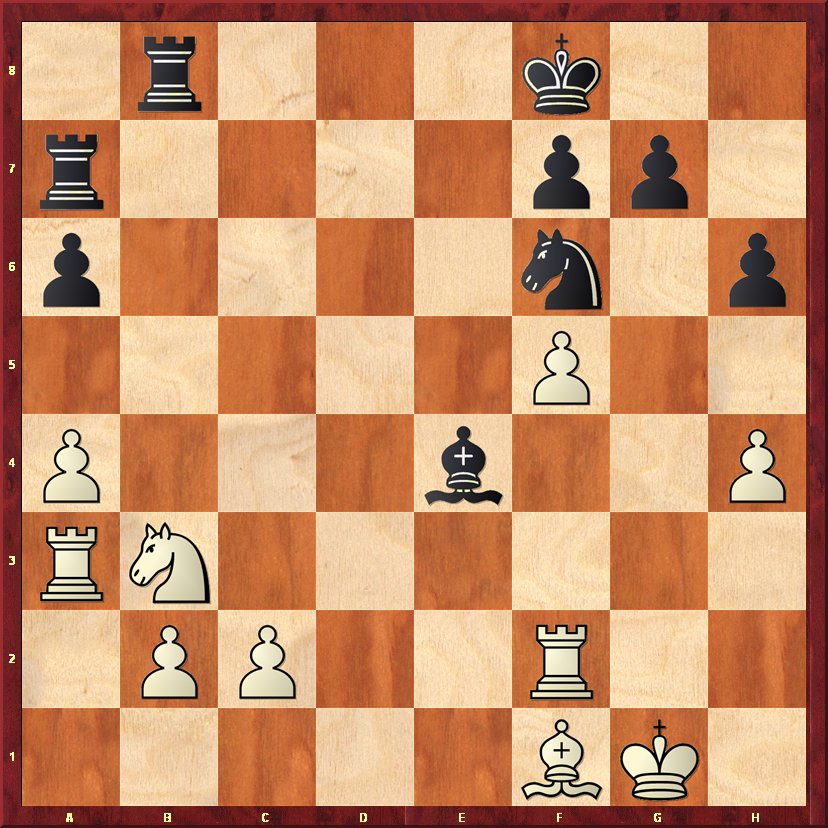
At this point in the game, I had about 3 minutes for 12 moves, while Alex had 2 minutes. If he had chosen either 29…Bd5 or 29…Ba8, it would have been really hard for me to come up with a plan to untangle my queenside in the time scramble. Fortunately for me, he panicked and blundered badly here with 29…Ng4?? 30.Rf4 Nf6 31.Nc5! Bxc2 (31…Bd5 would probably have given Alex more of a chance to survive, but the prospects are still quite bleak after 32.b4.) 32.Rf2! This was obviously the move Alex missed when he went for the whole variation. After this very nice move, Black is probably just losing. 32…Bd1 33.Nxa6 Rb6 34.b4! (Diagram 6)
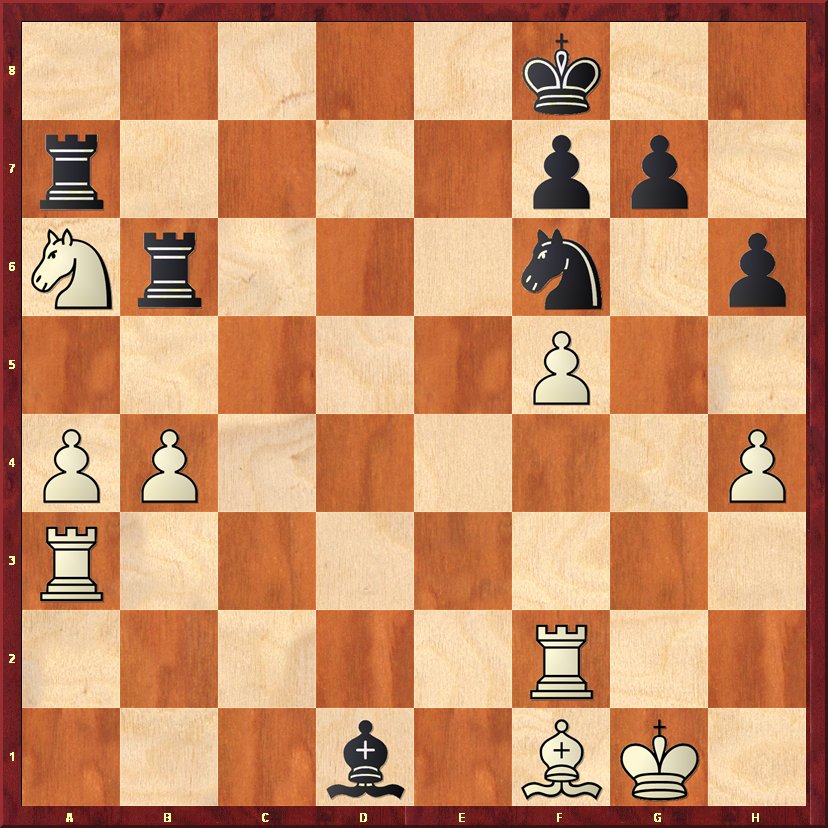
34…Rbxa6 35.Bxa6 Rxa6 36.a5 Go pawns, go! 36…Ne4 37.b5 Rd6 38.a6 Nxf2 39.a7 Nh3 40.Rxh3 (Diagram 7)
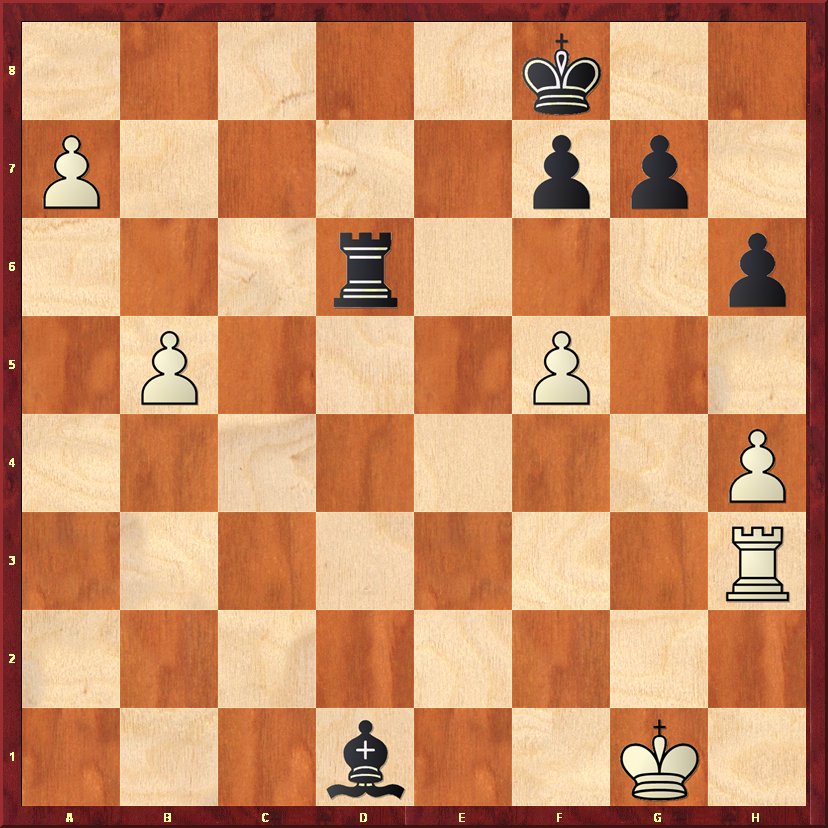
1-0 Alex resigned here in view of 40…Rd8 41.b6 followed by the inevitable 42.b7.
May 22, 2009 • General
Good morning to everyone from nice sunny and hot White Plains, New York. I apologize to everyone that I was not able to blog yesterday, but I spent much of the afternoon and evening in New York City, and I completely crashed when I got home around 10 PM from exhaustion.
In this, the third and final installment of my experiences from the US Championship, I will recap the rest of the tournament from after I won round 9 to the closing ceremony. In the last blog, I left off after I won my game against GM Josh Friedel. Throughout this game, I had my eye on the Hess-Akobian game for obvious reasons. Unlike two of his other games in the tournament, I was pleased to see that Varuzhan found a way to avoid a losing position after 15 moves with Black for a change. I was especially optimistic about the game when I saw queens come off early as this would appear to very much play to his style. At the same time, it also meant that he’d avoid getting blown off the board like he did against Gata and me.
After my game finished, I went downstairs to the commentary room and gave a few comments relatively brief comments to Emil Sutovsky,Jennifer Shahade and Macauley Peterson. I do not know if the audio broadcast was archived or not, but it was hard for me to really be anything but slightly dazed due to the incredibly anti-climatic nature of the final game I played. In 2005 when I won, I had to grind a very complicated endgame against GM Ildar Ibragimov which went well into the fifth hour. This time around, with a short three hour game requiring very little effort it was hard to say much of anything. After I left the commentary room, I went outside and made a brief call to my parents before Kris&I went off to get some lunch at Culpepper’s. About five or six minutes after we ordered food, I got several messages from people on my crackberry hearing that the game Hess-Akobian was drawn. In retrospect, I’m a little surprised I didn’t start screaming at the top of my lungs considering how much this victory meant to me. After I gulfed down my food, I ran back to the club for the final interview which I believe is on the actual website of the Saint Louis Chess Club.
Kris and I headed back to our hotel briefly just to see Kobe and company dominate the Rockets completely in game seven. After this we just chilled out and kicked back having accomplished our goal. I also tried to work on a speech while getting numerous messages and emails, etc from people. However, this proved to be a futile exercise as I just simply could not focus due to the massive amount of communication. Thank you for turning my life upside down, research in motion! After this, we headed back to the site hotel, The Chase Park Plaza for the ceremony while putting down our windows and blasting the brilliant song Last of Wilds. I have to say that not having a care in the world and being on such an emotional high is really what competition is all about.
The closing ceremony itself was held on the top floor of the ritzy Chase Park Plaza, although I forgot the name of the exact room and rooftop patio. Overall, it was very well done with alcohol (what a surprise) and plenty of h’orderves. When I first got up there, I had a feeling I’d get more than simply the big check like I had before and my intuition proved to be correct as they had a special jacket for the winner. There were many speeches including mine which were fun to listen to, although my speech got completely thrown off when my father inadvertently called me while I was actually talking. I must say that it is very hard to maintain your train of thought when you have a blackberry in your pocket vibrating. However, I somehow stumbled and bumbled through it and seemed to do a good enough job, so I won’t complain. After this we were treated to opera singing from Emil Sutovsky which, although, is not my type of music was nevertheless quite good. There really is nothing more to report after this other than accepting numerous congratulations enjoying myself and just realizing what a true pleasure it is to be at a chess tournament where every participant was treated as though chess is a sport and something worth being recognized. So with that, I bring to a close my report on the US Championship. It was a truly phenomenal event and probably the smoothest, stress free event which I have had the fortune to participate in.
May 20, 2009 • General
Sorry for not posting sooner, but in keeping with every day of this week thus far, I’ve been quite busy and when I’m not taking care of work, I am trying to enjoy some well deserved sleep. In case anyone from New York took time out of their evenings to check out the news, apparently CBS was very busy covering the Heart Walk in NYC so the piece did not actually air. However, I have been told that it will definitely air on the weekend for those who are still interested. Without further ado I will now pick up where I left off yesterday.
Round 5: Clash of The Titans
In round five I was paired against the top seed Gata Kamsky with White. Gata and I have been in constant competition ever since his return to chess. However, surprisingly, we have only played once despite playing in numerous tournaments together. The one time we played before was way back in 2004 shortly after his return to chess. We played in the Tuesday Night Masters which was a very strong event run by Greg Shahade and my good friend John Fernandez. In the game itself, Gata played the London system and we drew after a very eventful game which swung like a pendulum. Of course, neither of was as strong back then and it is very hard to put much stock in a game30 event where players have to rely more on intuition than pure calculation. Going into this game, my game plan was to play a solid brand of chess and see what would unfold. The game started off in a very weird fashion as I played 1.c4 and Gata responded with 1…g6!? This highly surprised me as I was completely expecting Grunfeld and I had the option to 2.Nc3 Nf6 3.e4 forcing a King’s Indian. In round 1, Gata opened with 1.c4 Nf6 2.Nc3 d5! against GM Ildar Ibragimov. Despite the general assessment that Gata was worse out of the opening, I do not agree with this assessment and had no plans of going back into the same variation. However, I then played 2.Nf3 Nf6 3.Nc3 d5 which essentially transposed into what I had prepared. The real surprise was when Gata chose to play 6…a6 against my Anti-Grunfeld. After playing a slightly obscure variation which I wasn’t completely familiar with, the position was roughly equal. However, I erred rather badly with 16.Rd1 instead of going for the more solid 16.Nxe6 Rxe6 17.f3 after which there have been several draws. After proceeding to misplay the middlegame I was considerably worse until Gata went 28…Nb5. If he had chosen 28…Bc4 he would have retained a substantial advantage. However, it is hard to fault Gata since in most of these lines which Rybka likes, a human would be scared of mating threats. Afterwards, the game petered out to a draw when I sacrificed my knight on g6 and forced a perpetual. One of the important lessons I learned from the first US Championship which I played in 2003 was that draws really aren’t the end of the world. I remember that year I drew GM’s Christiansen,Stripunsky and Seirawan in a row. At the time, I was completely unaccustomed to drawing so many games in a row. But that experience taught me to never panic and simply take advantage of the opportunities in other games. After starting off with 2.5/3 and drawing two games, I made it a point to not panic at all since I knew everyone would have to play each other anyway. Therefore, I was not overly concerned that I was a half point out of first place. Result: 3.5/5
Round 6: I Can See Light At The End of The Tunnel
In round six I was matched up against former US Champion, Alex Onischuk with Black. Alex and I have played in two prior US Championships before this. In our first encounter in San Diego in 2006, I was pressing Alex in the last round with Black after my epic comeback from the dungeon. Unfortunately, I came up just short and Alex was able to hold a draw and went on to win a playoff against Yuri Shulman to win his first of probably several titles. The second game was a lot worse in Stillwater, 2007, as I played a very bad line in the Scotch Gambit and was essentially lost after eighteen moves. It is really hard for me to put a whole lot of value on either of these games as I was highly disenchanted with chess in 2006 and simply riding a massive comeback streak right before I planned to quit chess and go to school. In 2007, I had just returned to chess after going to college and it was not the easiest re-adjustment as I was also playing a lot of poker during that tournament. In general, I don’t look at history very much unless it is clear cut and I was playing well during the time period. Alex, with his result this year also became the first player to not lose a game in four consecutive US Championships becoming the first person since Fischer to achieve the feat. As such, with Black against Alex, I figured that I simply wanted to play solidly and draw. Alex once again allowed a Nimzo for the third time in the tournament. Generally, Alex has preferred 3.Nf3 to 3.Nc3, but it appeared that he had specially prepared it for this tournament. We played a very slow and quiet line in the 4.e3 Nimzo. I prepared this variation in anticipation for the game after I looked at Onischuk-Kasimdzhanov from 2007 in which it appeared that Black easily achieved equality. Of course, I promptly played like a bumbling idiot and forgot the move order and played 11…Nbd7 instead of 11…Qe7. After this, the position took on a whole new meaning after 12.a4. Unfortunately, as I found out when I analyzed the game, Alex has played this exact position as black. The position progressed forward and we reached an interesting endgame around move twenty-six. It was here that I went wrong with 26…g6. According to Rybka 26…Nd2 was stronger. After this, Alex found the right plan with 27.Ra1 Rb4 28. Ba3 Ra4 29.Bxe4 Rxe4 30.Be7. I’ve looked at this endgame quite a bit now, and it appears there is no clear cut forced win for White. However, during the game I intuitively felt that there must be a winning variation for White. After sacrificing a pawn with 35…f5. I was able to draw quite comfortably. I definitely have to say that getting a worse position against Gata, this was my worst game in the tournament. It really was the only position I obtained in which I felt there was a realistic possibility that I might actually lose. Nevertheless I was still on track and just needed to start winning some games. Result: 4/6
Round 7: Crunch Time
At the 66% mark of the tournament, (I prefer percentages to fractions) I was now paying attention to the leaders and standings having gotten past the three most difficult players unscathed. In round seven, GM’s Akobian and Shulman held the lead with 4.5/6. There was a slew of right behind them on four points; however, I was paired against Akokian while Shulman was playing Onischuk. There come certain points in chess tournaments when you have to reach a certain level and just “do it.” This was certainly the time for me to turn on the jets and go for broke. Objectively speaking, I could draw Akobian and win my final two rounds as a way of winning the tournament. However, I strongly felt that if this happened, it would leave me in a situation where I would not control my destiny and perhaps not even guarantee a tie of first. Therefore, I approached this game with essentially a do or die attitude. Varuzhan and I have played quite frequently over the years. He beat me the first time we played way back in the Imre Konig Memorial in 2004 when neither of us had reached the GM title yet. Since then, we drew the last four until I finally broke through and beat him with White last year in the Montreal International. I once again got White in this game and was quite optimistic as Varuzhan seemed to be having some problems lately in his beloved French defense. Lately, Varuzhan has been playing the 3…dxe4 variation against 3.Nc3. However, he lost to me in August, Mastrovasilios in the olympiad and then to Gata in the same line as my original victory. Therefore, he decided to deviate and played the classical with 3…Nf6. I know that Varuzhan must have been slightly surprised when I went 4.e5 as I can only recall playing it once before in my life against GM Gabriel Schwartzman way back in the National Open in 2001. The next several moves were standard until I played the lesser known 9.h4 variation. Although this isn’t very well known, Kasparov has played it before so I assumed that it must be at least decent. The position was still probably roughly equal until Varuzhan avoided the quick endgame on move 13. After he allowed the shot 14.Bxc5 Nxc5 15.f5! he was in trouble for the rest of the game. Although he had a few chances to improve on his play later, there were no specific situations in which he woulda been able to affect the outcome. This win was, without a doubt the turning point. To reference, The Matrix, it was at this point that I truly started to believe that I could win. Result: 5/7
Round 8: A Trap Pairing
Having played all of the top players at this point, I got my easiest pairing of the tournament, playing home town hero IM Michael Brooks who is from Missouri. Although plenty of people were not thrilled with this pairing, it must be said that Brooks played himself into this position as he was on four points having beaten IM Ray Robson in the previous round with Black. When one looks at the tough life Brooks has had combined with the fact that he never had a computer before this tournament, he must be commended on his result. I know that if Brooks reads this blog, he’ll probably respond in the same manner as he did when we spoke after the tournament, saying that his result was very average. Nevertheless, I thought it was a very inspiring performance despite his losses in the last two rounds which stopped him from achieving a GM norm. However, I most certainly was not going to complain about it.
Fortunately or unfortunately, prior to this round there was a rest day which really gave me a chance to put it all in perspective and just relax. On the rest day, I studied very little chess as Kris and I spent the afternoon with the blogmaster, Dave and his wife at Pappy’s Smokehouse. The food was really good there, and it was quite refreshing to simply forget about chess and just enjoy myself. After this, I went to the Cardinals-Brewers game in the evening. Sadly, the ominous clouds and heavy rain eventually came and rained out the game in the second inning. Luckily, we were at least able to see the Cardinals hit a two-run homer. Overall, I am not a huge fan of baseball, but I found the new Busch Stadium to be extremely nice and comfortable. It is also quite a bit more affordable than the abomination called Yankee Stadium which pretty much represents everything I don’t believe in. The rainout might have been an omen though as it meant Kris and I had a lot more time to prepare as we got back to the Hilton at 10 PM instead of 12 or 1 AM in the morning.
What we concluded was that I should once again keep my opponents offguard and we prepared the Sveshnikov. Having played the Sveshnikov a fair amount in my younger days, I was quite familiar with a lot of variations which made it easier to prepare. Brooks slightly surprised me when he chose 7.Nd5 over the much more popular 7.Bg5. However, I was prepared for this as well and I played the line with Ne7-g6. Brooks really surprised me when he played the novelty 12.Bxg6. Although the computers still say the position remains equal, it relinquishes any possibility of an advantage. After this, I was able to slowly outplay him in the middlegame with my two bishops and duly converted the victory. Although I knew that I should win this game, I’ve had some unfortunate mishaps against slightly weaker IM’s and GM’s lately, so I definitely was not taking anything for granted. Luckily, I was able to maintain focus in this game which put me in prime position to win my second championship. Result: 6/8
Round 9: Is It My Time?
Before I get into the actual pairing in round nine, I must start on the evening after my victory in round eight since the game was played at 11 AM and ended around 3 PM. Kris and I went to our favourite restaurant Culpepper’s and ate our customary lunch/dinner before returning to the hotel to check on the results. When we actually left the trendy West End of Saint Louis, we felt quite strongly that the game Hess-Shulman would be a draw. We also assumed that Kamsky-Onischuk would be drawn as well. I must admit that I was extremely shocked when we got back to the hotel and suddenly Hess appeared to be pressing for the win. Kamsky-Onischuk was a draw as expected, but oddly enough when I got back it was right at the moment that Shulman played the horrible blunder 43…Rc6?? I refreshed the screen with live games a few times to make sure that this was not an error, as I felt that 43…a5,Nb8,Ke8 all drew relatively comfortably. Kris decided at this point to go to sleep so that he could prepare during the wee hours of the evening/morning while I was sleeping. Perhaps I should have taken a page from his book as I progressively got more annoyed as Shulman completely blew it and lost. Our assessment was that a win in round eight would probably give me the sole lead and I could decide what sort of style I wanted to play in the final game. When this game ended, I left the hotel and headed nearby Jefferson National Expansion Memorial and took a long walk. Normally, I find that getting air and clearing my head tends to work well right before very big games. I called a few friends and family during this time which helped me relax and just enjoy the moment before all the pressure which would squarely hit me in the face the following morning.
When I won my first US Championship in 2005, I was extremely nervous in the last round when I played GM Ildar Ibragimov. I think that this definitely showed in my play as I was in trouble right from the get go. Although I found away to right the ship, I have no doubt that nerves played a crucial role in reaching such a sticky situation. This time around, I really wanted to avoid any such drama and so I thought that anything but chess would be a great idea. As far as the preparation went, Kris and I started brainstorming a lot of ideas around 10 PM he still remained relatively undecided. Although he did most of the preparation, there are certain roles which everyone has to play. It was at this point that I told him I wanted to play something more double edged involving e4, so we decided to go with it. Throughout the tournament I generally tried to avoid double edged positions and just play for small advantages. In this very critical situation I felt strongly that the risk was worth it. Much of my experiences are drawn from when I won in 2005, and I remember thinking that if I beat Ibragimov with White it should be enough as Stripunsky was Black against Goldin. However, Stripunsky also went on to win which led to a playoff. I also thought that the odds of winning in the final round and ending it before a potential playoff were a lot higher than if I drew and had to go into what was almost certainly going to be a multi way playoff. I won’t debate the merits of the playoff system, but I felt it was flawed and would leave me in a very uncertain position.
As to the actual matchup, I got White against fellow GM Josh Friedel. Many people were making note of the fact that I do not have the greatest record against him. However, overall I had 5 wins, 3 losses and 3 draws out of 11 games. But Josh has had more success recently as he beat me in the US Championship in 2006 (Black) along with the Chicago Open (White) in 2008. Although I did terribly in Foxwoods, if there is one thing I must be thankful for it is that I played Josh there. After having so many good results against me in recent tournaments, I was able to play 1.g3 (Thank you Vancouver!) and obtain a completely winning endgame after a mere 20 moves. This pretty much destroyed the illusion for me that Josh had my number and also made me a lot more confident going into the game.
In the game itself, I opted for 1.e4 e5 2.Nf3 Nc6 3.Bc4! (First time I ever played this and it gave me a psychological edge!) Nf6 4.Ng5! d5 5.exd5. At this point in the game, I expected Josh to use a little time as he had several different options. Surprisingly, Josh used less than a minute and opted for the main line 5…Na5 which I had never seen him play before. The first real surprise came on move eight when I played Bd3 instead of the more common Be2. When Kris first mentioned this to me at around 11:30 PM, I assumed he was somewhat joking as it looked really funny. Kris told me that Morozevich had played it, and I figured why not! If Moro plays it, then it has to be sound, right? NOT! In the morning when I got up at 5 AM (I did not sleep well at all) to review, I went through most of the variations and felt White had good play despite the weird piece setup. In the game though, it worked out beautifully as Josh tried to go for a rook lift from b8-b4-f4/g4/h4. Although I cannot fault Josh for getting desperate at this point it only worsened his position and he went down in flames shortly thereafter. The first time that I truly began to start feeling pressure/excitement was when Josh sacrificed the exchange on d3. Originally I did not see the strength of 19.g4! followed by 20.d4. I simply thought Ng4 was winning, but after the counterpunch Nc6 with the idea of Nd4 the position remains far from clear (for a human since Rybka remains unimpressed). When I went 20.d4 Rd8 21.Qe2 I really started to a sense of true accomplishment as I knew I would win at this point. Most of the thoughts which really started going through my head were that I had finally done it and returned to a place which I have not been for the last few months. Josh played 21…Rxd4 which allowed the killer shot 22.Bc1 trapping his queen. I had to really try hard to restrain myself at this point from making any gestures or things of the sort as I was really overcome with emotion. When he resigned, I felt like a curtain had been lifted and I had been restored to the me of 2008. I will comment on the Hess-Akobian game in the third and final part of this recap. Result: 7/9
Part III will be coming tomorrow…stay tuned. Oh wait, it is already tomorrow so I guess it’ll be two posts in a day then, go figure!
















